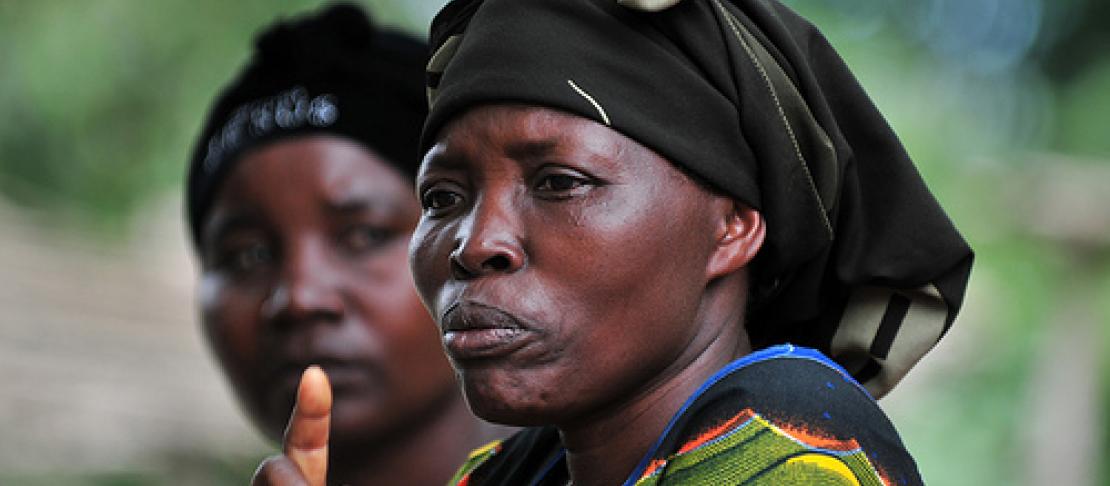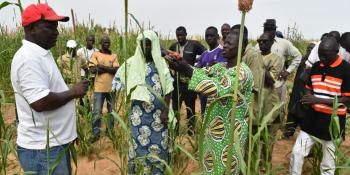Spotlight on gender and food security in Burkina Faso

Interview with gender grant recipient Some Laeticia, made by Moushumi Chaudhury and edited by Lisen Stenberg
In Burkina Faso’s agricultural sector, there are more women (52%) than men (48%), according to population analyses. Despite women making up of more than half of the labor force in agriculture, they have limited access to resources and extension services such as micro-credits, land rights, access to technology and know-how. And their contribution to their country’s current and future food security is not properly acknowledged either. “Gender equity is progressing in Burkina Faso” says Some Laeticia, who focuses on gender barriers in the design and implementation of climate change related policy for agriculture and food security in Burkina Faso. She describes the progress which includes a Permanent Secretary in charge of gender issues; the development of women producers associations; and progressive integration of women in decision-making. But, she notes, “very little has been done to systematically address gender integration in policies, particularly on agriculture and climate change. A more in-depth analysis is needed of the barriers that prevent the integration of gender into policies, whether they are social, legal, economic or political.”
Climate change increases the social burden of women
The division of responsibilities between men and women at the household level is a crucial factor for understanding gender differences in the agricultural sector. For example, in Tougou in Northern Burkina Faso, women are involved in small-scale agricultural work such as sowing seeds and responsible for their family’s well-being - for example taking responsibility for their children’s education, hygiene and sanitation around the house. They are also responsible for collecting water, harvesting crops, processing grain, preserving and processing non-timber forest products, as well as collecting wood. “With climate change there is concern that women need to do more to find water and wood. This has an impact on food quality, hygiene and ultimately the health and productive capacity of family members” says Some.
Meanwhile, men are responsible for activities around planning the family farm, such as choosing new land for clearance, selecting seed varieties and speculation, acquiring cattle, and managing grain stocks. The impact of climate change is felt more by women than by men, because women are present from production to processing of products. Given these findings, women understand the impact of climate change because beyond working in the field, they are also responsible for the well-being in the household.
Evidence-based knowledge on gender and climate change
By thoroughly examining the gaps in policy and practices on addressing gender issues in climate change and food security, Some hopes her research will support the improvement of the current situation faced by women in Burkina Faso. The evidence will be made available to decision-makers and the scientific community, and will detail some of the legal and technical approaches and tools that can be used to mainstream gender into climate change, agriculture and food security policies.
Adopting a common understanding of ‘gender’
When asked about the obstacles and challenges she has faced while conducting her research, Some mentions problems related to defining the concept of ‘gender’ amongst various stakeholders. As part of her work, Some collaborates with community members to help clarify what is meant by ‘gender,’ which is necessary to then identify gender gaps and make the right connections with potential policies for climate change and food.
Getting the messages out to farmers and policy makers
Some believes that climate-proofed food security can only be achieved if gender-sensitive strategies for adaptation to climate change are effective. “Climate change and food security is a common problem regardless of gender,” she says. The challenge lies in lifting certain social barriers, which may be rooted in tradition, religion and culture, so that resources are available to all, regardless of gender. When it comes to policy makers, she emphasizes that they should develop specific indicators to monitor how gender is being implemented on the ground by national programmes such as the National Adaptation Programme on Action to Climate Change (NAPA) and the Strategy for accelerated Growth and sustainable development. “Policy makers also have to encourage communicators, such as journalists and local associations, to share and disclose messages about gender, climate change, agriculture and food security in order to raise awareness about the need to combine all available energies on this challenge.”
Read more about Some Laeticia's research by downloading her technical progress report (PDF).
You can read more about CCAFS gender work in the context of climate change and food security here.
Read more about our gender grant recipients and Some Laeticia's research here.
This story is based on an interview between gender grant recipient Some Laeticia and Moushumi Chaudhury, Science Officer Theme 4.1 Linking Knowledge with Action. The story was edited by Lisen Stenberg.



